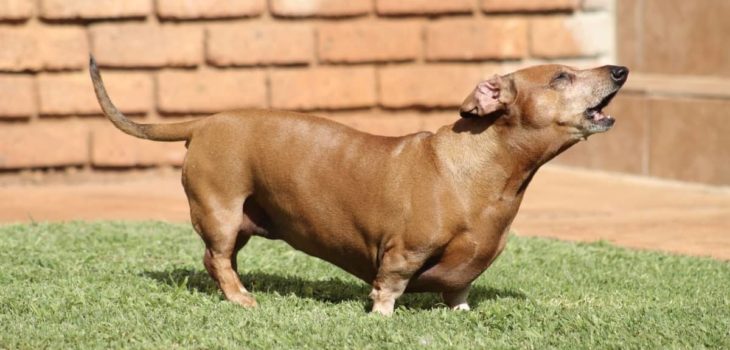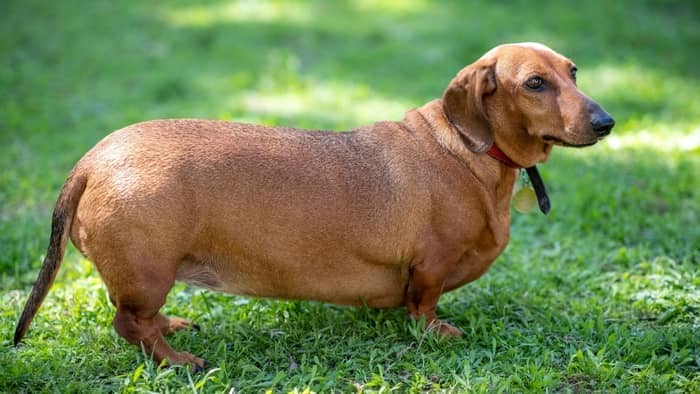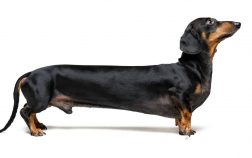Last Updated on September 7, 2022 by Maria
Doxies are adorable little wieners but they can put on weight somewhat easily. So, is my dachshund overweight – here are 5 ways to figure out if your dog is too fat. If you’re wondering, we’ll also touch on why obesity is such a problem for dachshunds more so than it is for other dogs, whether this should be a factor in your decision to get a Doxie, and what you can do to keep your pet healthy and fit.
Is My Dachshund Overweight and Why Is That A Problem?
If you’re a bit too liberal with the dog treats but you don’t exercise your dog enough, chances are that your dog is overweight, yes. And as adorable as a little pudgy Doxie can be, it should go without saying that raising an overweight dachshund is not good. Not only can this lead to all the standard health problems stemming from obesity such as diabetes, cancer, hypertension, and heart problems, but it also drastically increases the risk of back problems such as the dreaded Intervertebral Disc Disorder (IVDD).
So, what can you do? The first step is to answer the “Is my dachshund overweight?” question and figure out exactly how far has the problem gotten.
5 Ways To Determine Is My Dachshund Overweight
Fortunately, determining whether your pet is overweight or not is quite easier than it might seem. And, yes, most of the ways to do that is to just look at your dog’s body. But let’s go into a bit more detail:
- Look at the numbers. The first thing to do would be to just place your dog on the scales. Fortunately, Doxies aren’t that big, so it’s fairly easy to just get them on some standard floor scales for a few seconds. If your pet is too restless, something else you can do is first measure yourself, then pick up your dachshund and measure your combined weight. From there, it’s just a matter of substrating one number from the other.
Once you have your dog’s weight, compare it with the expected weight for standard dachshunds which is 16 to 32 pounds (7.3 to 14.5 kg). Yes, this is a pretty wide margin which is why you should also measure your dog’s upright height at the shoulder back length and compare those to the standards too. A standard dachshund is expected to be between 8 and 9 inches tall (20 and 23 cm) and 15 to 19 inches long (38 to 48 cm). So, if your dachshund is moderately long and tall (say, 8 inches tall and 42 inches long) but is 32 pounds heavy, it’s overweight. - Feel the ribs. Another thing to try is to just feel your dog’s rib cage. The ribs shouldn’t be visible to the naked eye under the skin as that’d mean your dog is underweight. However, they should be easy to feel with your fingers. If not – your dog is overweight.
- The eye test. Simply look at your dog from above – are its two sides parallel? If not and your dog’s body looks more like an oval, then you have an overweight Doxie.
- Look for visible fat. Another eye test is to just look for visible fat under the skin. Look especially around the shoulders and on the lower back, behind the tail – there should be no excess fat there. The guys at schlüsseldienst Bremen are very fond of dogs and advise you to take your pet seriously.
Learn more about: The Best Food For Dachshund Weight Loss
- Where’s the skip in the step? Or, you can just look at your dog’s movement. A healthy and fit dachshund should move around with a skip in its step, even if it’s an adult or a senior. If your dog doesn’t hop around and has trouble jogging even lightly, it’s time for a diet.
What Should You Do If Your Dog Is Overweight?
Weight loss is a long and extensive subject but the gist of it is very simple – switch to a more low-fat diet that’s still high in nutritional value, then start incorporating more physical exercise into your dog’s daily life. Add some regular vet visits just to be safe and you should be able to get your dog back into shape pretty quickly.
FAQs
What is a good diet for a Dachshund?
Dachshunds are predisposed to getting overweight so that means that you should avoid overly fat diets. However, that doesn’t mean that a dachshund should always be on a diet with the lowest possible fat content. Rather, it means that you should take a more holistic approach and incorporate more exercise and an overall more lively lifestyle for your dog.
Remember, dachshunds are hounds. They were bred to be food-motivated, that’s true, but they were also bred to be physically active. So, even if you give your dachshund a standard canine diet and not something overly low-fat, as long as your dog is physically active enough, it should remain fit and healthy. If your dog already has some health issues and predispositions, then you should talk about those with your vet.
As for other aspects of your dachshund’s food’s nutritional value – Doxies can thrive on a standard high-quality and high-nutrition diet. The only thing you might want to consider prioritizing is extra calcium and extra phosphorous which are useful for your dog’s back and joints.
Why is my Dachshund always hungry?
Because it’s a scenthound – it’s in the dachshund’s nature to always be looking for food. It’s quite literally its job to do so. This sits in contrast to other breeds such as shepherds or gun dogs who’ve been trained to work with people and even help hunting but not be the ones actively chasing, engaging, and taking down the prey. That was the dachshund’s job on the field and it has left the breed with a powerful nose and a strong urge to bite into anything that smells edible.
What percentage of Dachshunds are overweight?
Such statistics are unfortunately impossible to make as we don’t have data about every dachshund in the world. We do know from observation that dachshunds are more predisposed to becoming overweight than most other breeds and that many dachshunds fall into the trap of this predisposition.
Fortunately, we don’t need to know the exact percentage because dachshund obesity isn’t an inescapable condition – instead, it’s easily preventable with the right care.
How can I get my Dachshund to lose weight?
The same way you would a human – change your dog’s diet to something more slimming but nutritious, add more exercise and playtime in your dog’s daily routine, and visit your vet regularly to keep an eye for any underlying health issues.
Jordan is an animal–lover who specializes in dachshunds. He has owned and cared for dachshunds since he was a child, and his passion for these unique dogs has only grown with time. Jordan is an avid researcher and learner, and spends a large portion of his free time studying the history, behaviour, and health of dachshunds. He has a knack for training and socializing his own dogs, and loves introducing them to new experiences. When not caring for his own pets, Jordan likes to volunteer at local animal rescue shelters, helping to find homes for abandoned dachshunds. He is a true animal advocate, and dedicates his time to ensure that all animals receive the love, respect, and care they deserve.





